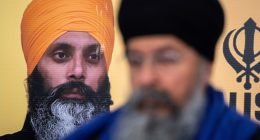I was taught our minds were the most important part of us – now so many have been captured and polluted
In 1995, the celebrated Indian film-maker Saeed Mirza made a film called Naseem. Set in Agra, a town in Uttar Pradesh, between June and December 1992, it portrays the lead up to the demolition of the Babri Mosque in Ayodhya by rightwing Hindu organisations, led by the Rashtriya Swayamsevak Sangh (RSS). The film’s titular character asks her grandfather why he did not go to Pakistan at the time of partition. He says: “Your grandmother loved the neem tree in the back yard.” In the middle of the partition riots of 1947, when thousands of Muslims were being massacred in India, as were Sikhs and Hindus in Pakistan, Naseem’s grandmother was so emotionally connected to the neem tree, to the mother Earth, that she would rather take the risk of being killed than leave.
One hundred and twenty-five miles from Agra, in Delhi, my father, Haneef Hashmi, also refused to go to Pakistan during the riots. He was a student leader, a freedom fighter, and had spent years in the British jail. He refused to leave India, despite an attack on his family, because he believed in the idea of a diverse, democratic secular country, which was not formed on the basis of religion but on the principles of fraternity, equality and justice.



